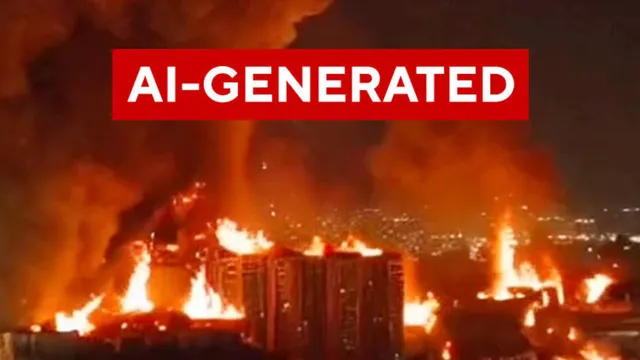
AI video shows aftermath of Israeli airstrike in Beirut
2024-10-07 10:58- A viral video montage depicted the aftermath of Israeli airstrikes in Beirut, combining AI-generated and real footage.
- The AI content was sourced from a TikTok account known for creating sensational videos, while the real footage was verified by CBS News.
- This incident underscores the ongoing conflict in Lebanon and raises concerns about misinformation in media.
Express your sentiment!
Insights
In Lebanon, a video montage depicting the aftermath of Israeli airstrikes went viral on social media, particularly on X. The video, which included AI-generated imagery, showcased massive fires on the Beirut skyline. The AI-generated content was sourced from a TikTok account known for creating sensational videos. While the initial part of the montage was fabricated, it was followed by authentic footage of an Israeli strike near Beirut's international airport, verified by CBS News. This incident highlights the ongoing conflict between Israel and Hezbollah, which has escalated in recent weeks, leading to significant destruction in Lebanon. The Council on American-Islamic Relations (CAIR) shared the video but later deleted it, acknowledging the mix of AI-generated and real footage. The situation in Lebanon has been dire, with numerous verified videos showing extensive damage and chaos in the streets as a result of the bombardment. The use of AI-generated content in this context raises questions about the impact of misinformation and the portrayal of conflict in media.
Contexts
The Israel-Hezbollah conflict has escalated dramatically since the onset of the war on Gaza last October, with both sides exchanging fire across the Lebanese-Israeli border. Reports from Beirut indicate that the situation has devolved into full-scale war, particularly following the Israeli airstrike that killed Hezbollah's leader, Hassan Nasrallah, on September 27. This attack, which targeted residential buildings in Beirut's southern suburbs, also claimed the lives of several key Hezbollah commanders, intensifying the group's retaliatory actions against Israel. Hezbollah has been engaged in a series of attacks against Israel since October 8, aiming to deter Israeli military operations in Gaza that have resulted in significant civilian casualties. The Israeli military has responded with airstrikes on Hezbollah positions in southern Lebanon and the Bekaa Valley, marking a significant escalation in hostilities. The conflict has displaced thousands, with reports indicating that over 97,000 people have been forced from their homes in Lebanon alone. The killing of Nasrallah is seen as a pivotal moment in the conflict, as he was a central figure in Hezbollah's military and political strategy for over three decades. His leadership was instrumental in transforming Hezbollah into a formidable military force, capable of challenging Israeli operations in the region. Analysts suggest that this loss could weaken Hezbollah's operational capabilities, although the group has vowed to continue its fight against Israel. As the conflict continues to unfold, the international community watches closely, with fears of a broader regional war looming. The ongoing violence has not only exacerbated the humanitarian crisis in Lebanon but has also raised concerns about the stability of the entire Middle East, as both Hezbollah and Israel prepare for what could be a protracted and devastating confrontation.